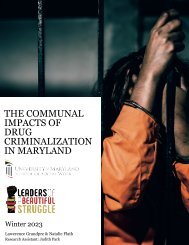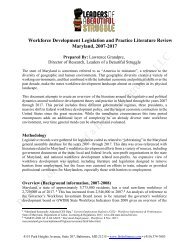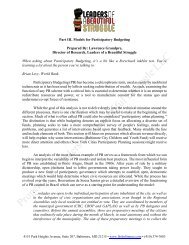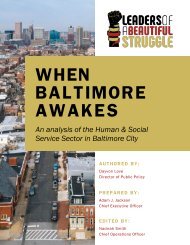Drug Decriminalization in Maryland Through an African Centered Research Paradigm- Analysis and Recommendations
This document offers guidance for theorizing questions related to a proposed research project purposed to advance drug decriminalization in Maryland.
This document offers guidance for theorizing questions related to a proposed research project purposed to advance drug decriminalization in Maryland.
- No tags were found...
You also want an ePaper? Increase the reach of your titles
YUMPU automatically turns print PDFs into web optimized ePapers that Google loves.
from military dictatorship to democracy required the destruction of old <strong>in</strong>stitutions built to support<br />
the military regime <strong>an</strong>d the refashion<strong>in</strong>g of a democratic civil society; this is a recipe for disrupt<strong>in</strong>g<br />
psycho-social <strong>in</strong>tegration <strong>an</strong>d under Alex<strong>an</strong>der’s theory it is logical under these conditions<br />
addiction would <strong>in</strong>crease. Indeed, one could use Alex<strong>an</strong>der’s theory to present the hypothesis that<br />
as decmoratic civil society reasserts itself, psycho-social <strong>in</strong>tegration could be reestablished <strong>an</strong>d the<br />
addiction “epidemic” could largely resolve itself, a hypothesis supported by the fact that, <strong>in</strong> 2001,<br />
only 8% admitted drug use, putt<strong>in</strong>g Portugal's drug use rates among the lowest <strong>in</strong> Europe even<br />
before the roll<strong>in</strong>g out of the “revolutionary” drug decrim<strong>in</strong>alization regime (ibid). While it’s<br />
possible that self reported drug use rates c<strong>an</strong> under count actual drug use rates, as <strong>in</strong>dividual may<br />
feel a self of shame (especially <strong>in</strong> a concervative society like Portugal), one could imag<strong>in</strong>e similar<br />
dynamics be<strong>in</strong>g at play <strong>in</strong> all the Europe<strong>an</strong> nation’s who self reported data. That Portugal's drug<br />
use rates did not seem to be beyond the norm for a Europe<strong>an</strong> country further supports the notion<br />
that a proper <strong>an</strong>alysis of Portugal's drug addiction “crisis” must <strong>in</strong>clude the context of racialized<br />
fears of “wasted whiteness” be<strong>in</strong>g part of the impetus driv<strong>in</strong>g policy ch<strong>an</strong>ges.<br />
This is import<strong>an</strong>t not only <strong>in</strong> underst<strong>an</strong>d<strong>in</strong>g the context which produced the sense that there<br />
was <strong>an</strong> “addiction crisis” <strong>in</strong> Portugal <strong>in</strong> the 2000s, but also to underst<strong>an</strong>d the solutions which were<br />
proposed <strong>an</strong>d why they were deemed acceptable <strong>in</strong> that specific period of time. The Portugal<br />
experience is often narrated as the rise of science <strong>an</strong>d reason overwhelm<strong>in</strong>g political <strong>in</strong>ertia,<br />
lead<strong>in</strong>g the creation of <strong>an</strong> enlightened solution through differ<strong>in</strong>g to expertise, as Domosławski<br />
write:<br />
“The Portuguese government’s actions <strong>in</strong> 1998 went precisely aga<strong>in</strong>st all of the typical<br />
<strong>an</strong>d expected “emergency” policy responses. Instead, the government appo<strong>in</strong>ted a<br />
committee of specialists—doctors, sociologists, psychologists, lawyers, <strong>an</strong>d social<br />
activists—<strong>an</strong>d asked the committee to <strong>an</strong>alyze the drug issue <strong>in</strong> Portugal <strong>an</strong>d formulate<br />
recommendations that could be turned <strong>in</strong>to a national strategy.” (ibid).<br />
Given Ani’s <strong>an</strong>alysis of “scientific rationality” <strong>an</strong>d “objective reason” be<strong>in</strong>g use as tools to<br />
promote Europe<strong>an</strong> superiority <strong>an</strong>d dom<strong>in</strong>ation, it is import<strong>an</strong>t that researchers be skeptical of this<br />
narrative. For example, it was not objective, expert led political debate, but the specific<br />
circumst<strong>an</strong>ces of Protuguese society that to drug decrim<strong>in</strong>alization laws pass<strong>in</strong>g <strong>in</strong> the early 2000s.<br />
Dur<strong>in</strong>g the late 90s <strong>an</strong>d early 2000’s, Domosławski report that their was still a feel<strong>in</strong>g <strong>in</strong> Portugese<br />
society that remember the abuses of power under the military dictatorship <strong>an</strong>d creat<strong>in</strong>g a unique<br />
sense of sympathy for folks suffer<strong>in</strong>g under the boot of state authority, writ<strong>in</strong>g:<br />
“The fact that there was opposition to the new law <strong>an</strong>d reforms serves to underscore a<br />
const<strong>an</strong>t <strong>an</strong>d fundamental question about the process <strong>in</strong> Portugal: why did the government<br />
adopt the new policy so decisively? Some of those <strong>in</strong>terviewed for this study expla<strong>in</strong>ed it<br />
simply as the government hav<strong>in</strong>g a fundamental conviction <strong>an</strong>d the political will to have<br />
what it saw as the right path prevail. Another <strong>in</strong>terviewee from the IDT noted that after<br />
years of liv<strong>in</strong>g under a dictatorship, the Portuguese public was sensitive to the needs of the<br />
aggrieved <strong>an</strong>d society’s weaker members; bear<strong>in</strong>g this <strong>in</strong> m<strong>in</strong>d, the government could feel<br />
4151 Park Heights Avenue, Suite 207, Baltimore, MD 21215 • www.lbsbaltimore.com • (410) 374-7683









